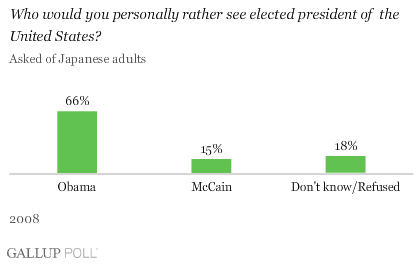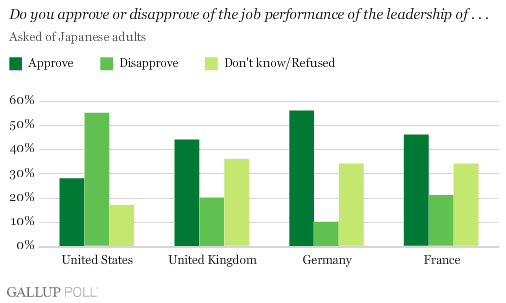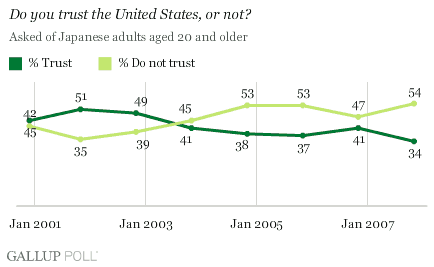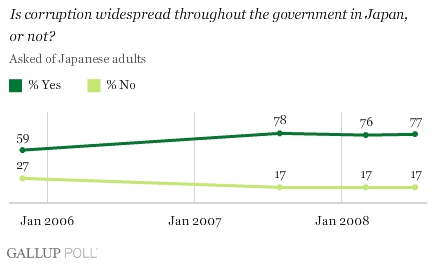TOKYO -- A Gallup Poll conducted in late June and early July 2008 finds Japanese support Barack Obama over John McCain in the U.S. presidential election. Two-thirds of Japanese adults (66%) surveyed by telephone say they would "personally rather see" Obama elected, while 15% say they would prefer McCain. Eighteen percent express no opinion.

What Explains Obama's Popularity?
According to a Gallup Poll conducted in Japan in June and July 2008, 55% of Japanese say they disapprove of the job performance of the leadership of the United States. When asked the same question about the leadership of other Western democracies -- the United Kingdom, Germany, and France -- more Japanese say they approve of these countries' leaderships than disapprove.

Although diplomatic relations between the United States and Japan have remained stable, the Iraq war has proven unpopular among the Japanese public. A March 2003 poll in the Asahi Shimbun newspaper found three in five Japanese opposing the invasion, and Japanese public opinion has revealed an increasing skepticism about the United States' motives. A separate Gallup Poll conducted for Yomiuri Shimbun shows the change in attitudes after the U.S.-led invasion: In November 2002, five months before the war, more Japanese (49%) said they trusted the United States than did not (39%); by November 2003, this had reversed, with 53% saying they did not trust the United States. The most recent poll taken in November 2007 shows just one in three trusting the United States.

To date, Obama has had little to say about U.S.-Japan relations other than to affirm the alliance. Yet, as his foreign policy has been built around a critique of Bush, including early opposition to the Iraq war, he would seem more in sync with the Japanese public than McCain who, particularly on Iraq, is more closely associated with Bush.
In a recent Pew Research Center poll, "favorable" ratings among Japanese toward the United States fell from 61% in 2007 to 50% in 2008 -- one of the biggest declines among 21 nations with trend data on the question.
The issue of global warming may be affecting Japanese opinion of U.S. leadership. In 2001, Bush withdrew the United States from the Kyoto Protocol, and he has been consistently critical about the framework throughout his presidency. A Gallup Poll conducted for Yomiuri Shimbun in mid-November 2007 found 93% of Japanese saying the United States "should participate in a new international agreement to prevent global warming." Furthermore, a Gallup Poll in March 2008 reveals Japanese remain deeply concerned about global warming: 98% say they know something or a great deal about climate change, and 75% think the threat of global warming is at least a somewhat serious threat.
However, prominent Democrats such as Al Gore have given attention to the problem of global warming. And Obama himself, during a visit to Kenya in 2006, said that the United States should have continued to negotiate the Protocol even if it wasn't the "perfect arrangement."
"Change" May Be Resonating Among Japanese, Too
Obama may be tapping into the Japanese public's broader desire for change at a time when the country's politics may be viewed as stagnant and corrupt. Within the past two years, two prime ministers, Shinzo Abe and Yasuo Fukuda, have resigned amid low approval ratings. Abe's government suffered from a series of bribery scandals, gaffes, and a major bureaucratic mishap involving lost pensions, which led to the ruling Liberal Democratic Party's historic defeat in the election for the upper house of parliament in July 2007. Fukuda, facing the new Democratic Party of Japan-led coalition, suffered the first no-confidence motion in Japan's postwar history and presided over another bribery scandal involving an Abe appointee in the defense ministry. In a March 2008 Gallup Poll, 77% of Japanese say corruption is widespread throughout the government, up from 59% in 2005. Further, 81% of Japanese think the government is not doing enough to fight corruption.

Survey Methods
Results are based on telephone interviews with approximately 1,000 adults living in Japan, aged 15 and older, conducted in November 2005 and August 2007, and 750 adults in March 2008, and 750 adults on June-July 2008. For results based on the total samples of adults, one can say with 95% confidence that the maximum margin of sampling error is ±4 percentage points for a sample of 750 and ±3 percentage points for samples of 1,000. In addition to sampling error, question wording and practical difficulties in conducting surveys can introduce error or bias into the findings of public opinion polls.
